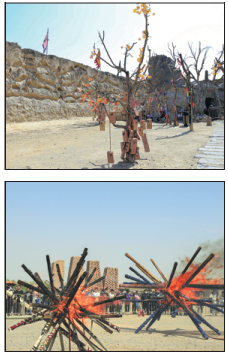Ancient ruins add to drama of arts festival

As dramatic backdrops go for an arts festival, it's difficult to beat the ruins of two ancient fortresses. But it is just such a setting amid which the China West Film Studio at Zhenbeipu in Northwest China's Yinchuan is hosting the Installation Art Festival, which opened on May Day and will run until Oct 5. Featuring installations and music, it adds elements of contemporary art to the film studio, which is already a popular tourist destination in western China.
The two fortresses, dating back to the Ming and Qing dynasties (1368-1911), is home to 20 large-scale installation works, all of which are crafted from materials, such as wood, bamboo and brick, sourced from Yinchuan, the capital city of Ningxia Hui autonomous region. Yellow is the predominant color of these locally produced materials and can be seen on ancient buildings and the walls of the fortresses.
"Localization is key when artists create these installations. We have to make public art match the environment. We hope visitors can interact with them without difficulty," says Diao Zhong, one of the curators.
Along with the contemporary art show, a concert was also staged. Musicians re-created children's songs that were once popular in seven cities in western China to remind audiences of yesteryear. The team spent a month visiting the seven cities to gather and learn local children's songs.
Known as "the oriental Hollywood" in the 1990s, the film studio is a key filming location where more than 200 popular movies have been made, including Zhang Yimou's Red Sorghum (1987) and Stephen Chow's comedy series A Chinese Odyssey in the 1990s. It is also a popular tourist destination for visitors who want to experience the wilderness that is depicted in those classic movies.
Although the COVID-19 pandemic forced many to stay at home in 2020, the number of visitors to the site was still an impressive 1.5 million, a slight decline from 1.7 million in 2019, according to studio officials. The festival's opening saw a surge of tourists during the five-day May Day holiday, says Zhang Gongfu, general manager of the film studio, which was established by his father, Zhang Xianliang, in 1993. His late father, then a famed writer, invited many of his director friends to shoot their films there in the 1990s.
In 2015, Zhang Gongfu held a contemporary art festival in the studio for the first time, inviting artists from home and abroad to create public artworks in the barren landscape near the studio. The Museum of Contemporary Art Yinchuan has also opened its doors to the public, providing a unique space to appreciate creativity in comfort. Both the festival and museum signify the appeal of art regardless of its surroundings.

Today's Top News
- Wang to meet foreign ministers of Cambodia, Thailand in Yunnan
- China's top legislature concludes standing committee session
- Thailand and Cambodia agree to temporary ceasefire
- NPC's 4th annual session slated for early March
- Civilizational links for a fairer world
- Manufacturing in China spurs global growth






























